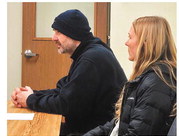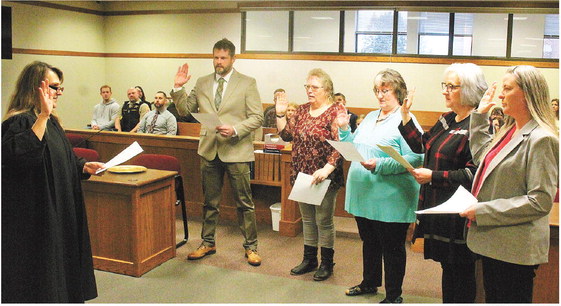Live theater
The summer when my daughter was about six years old we took her to see her first play.
Medford Area Community Theater was performing “Joseph and the Amazing Technicolor Dreamcoat.” “Joseph” happens to be one of my favorite shows and I have seen it performed at the high school, college, community theater and professional levels about 8 or 9 times over the years. The MACT performance still ranks among the best I have seen.
Russ Jablonsky played the role of Pharaoh and in one scene threw a scarf into the audience with it landing in Beth’s lap. My daughter still has that scarf in her large tub of treasured childhood items.
I was thinking about that play on Saturday night when my family and I were sitting in the front row watching MACT’s production of “Cemetery Club.”
Unlike toe-tapping big-cast musicals with elaborate sets and costumes, this play was much more intimate on the order of sitting around a kitchen table over coffee versus meeting in some fancy bistro.
As always the cast did a fantastic job. The jokes had us giggling and the more somber moments had even my teenage son wiping at moisture in his eyes.
There is something special about live performances. This is expanded upon even more when you know the people who are acting out their scenes only a few yards away from where you are sitting. Anything can happen in live theater and no two productions are the same.
Typically community theater has a three-day run of Thursday through Saturday. The cast works for weeks and months to put on three shows — three shots to build memories and change lives. Art, whether it is a painting on a wall, a well-played piece of music or actors on a stage is supposed to change and move the viewers.
While the actors and actresses on the stage are the ones who get the most applause, all of it is guided by the hands of the director. This person, part coach, part taskmaster is charged with the task of putting the pieces together. Sometimes this takes a gentle nudge, other times a crowbar and 16-pound sledge hammer. It is the director’s vision which can turn a group of people repeating memorized lines into a cohesive story.
Doug Robertson stopped into The Star News office this fall with a press release announcing auditions for the play. As we did whenever our paths crossed, we talked for a little while. There was a shared excitement for the play. It was another step toward things going back to normal after two long years of dealing with the a world that had been turned upside down for so many.
I brought a copy of the audition schedule home and continued my decades-long attempts at trying to convince my wife she needed to try out for a play — she declined saying she was too busy with work to take on any more commitments.
I had touched base with Doug several times since that conversation asking how the play was coming together and had on my calendar to reach out to him and schedule a time for me to come and take pictures of the cast. He died before I got a chance to make that call. Fortunately, Bill Dallas was willing to step up into the director’s role from assistant director and helped make the show go on.
Cemetery Club is a play that is about loss and how people choose to live with that loss.
It is a play that hits close to home for anyone who has lived with the passing of someone close to them.
When the last applause for the actors faded away, MACT president Patrick Porten walked out on the darkened stage with a sole spotlight illuminating an empty spot and talked about Doug and what an impact he had on theater in Medford and beyond.
There is something special about watching a live performance. Part of what makes it special is that you know there are no do-overs, no second chances to get that scene just right. It is fleeting and all too soon it is over. The house lights come up and the only thing left is striking the set and making sure all the props get put away.
Brian Wilson is News Editor at The Star News.



